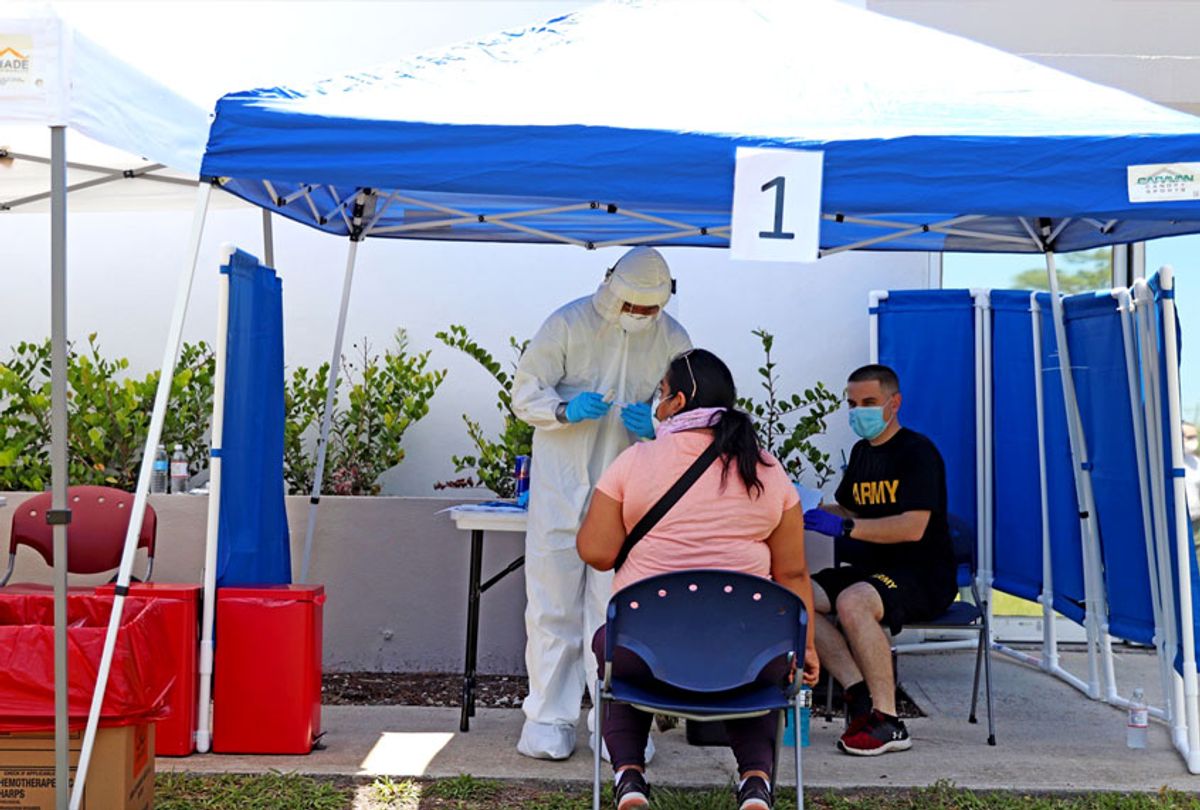Last week, an Intensive Care doctor in a central Florida hospital placed a call to Mexico to the parents of Juan Santiago (pseudonym) to inform them that their son was not expected to survive the next twenty-four hours. The next day, Juan, a farmworker from Immokalee, Florida, died from complications of the novel coronavirus. Sadly, his last days were spent without family in a city he had never even visited before he was intubated. "It's so tragic", said the ICU doctor, "and he was so young."
Like many other essential workers infected who couldn't shelter at home during the pandemic, Juan was healthy before being exposed to the virus. When he became ill with a cough and fever in April, he'd been working at Oakes Farm, based in Naples, Florida. Alfie Oakes, the founder and CEO of Oakes Farm, claimed in March that COVID-19 was "the largest government and media hoax in history" and posted on Facebook that "the people that have propagated this hoax should get the death penalty for their reckless behavior." In April, Oakes Farm Vice President Steve Veneziano called COVID-19 "absolutely nothing" and said coverage of the pandemic by the media was "an attack on this country."
Juan's story – his deadly battle with COVID-19, and his employers' denial of the importance of the virus – is a microcosm of the story of the pandemic today. What happened tragically to Juan provides important lessons not only for the state of Florida — one of the country's leading food producers — but for the nation's food system as a whole.
I am a physician and medical anthropologist. Normally, I live in California where I teach public health, medical anthropology and environmental studies. But the week I taught my last (virtual) class of the semester, I flew to Florida to volunteer because of what I heard from Immokalee, where I've been for the past month. Alongside community organizations, I've performed coronavirus testing, led public health trainings, answered questions on the radio, and handed out washable masks. What I've witnessed here is deeply disturbing.
Of the dozens of tests I performed as a volunteer, over 50% were positive — though it is worth noting that this is from a small sample, given the dire lack of testing resources available to the community over the past weeks. Even so, this may be one of the highest community rates of coronavirus infection in the country — even in the world! Echoing these results, the cases of coronavirus in Immokalee and other Florida farmworker communities like Homestead and Belle Glade have begun to spike. Far from flattening, the curve is taking off, becoming a steep and dangerous mountain.
In March and April, the Coalition of Immokalee Workers (a locally-based human rights organization) called for urgent resources to fight the pandemic, given the lack of hospital beds and ventilators in the midst of overcrowded housing and transportation for tens of thousands of workers deemed "essential" but left unprotected. One of the co-founders of the Coalition wrote in April, "if something isn't done – now…, the men and women who plant, cultivate and harvest our food will face a decimating wave of contagion and misery in a matter of weeks…." Another member of the Coalition explained that the living and working conditions of farmworkers juxtaposed with the lack of health services made them "dry tinder in the path of the wildfire that is COVID-19."
Today, due to the overcrowded living and working conditions in farmworker communities like Immokalee, and also to uneven and delayed responses from state and local health departments charged with heading off the crisis – we see clear signs the predicted wildfire is taking off. As a result, Florida's and the country's food system are headed toward a steep precipice.
Meanwhile our elected leaders broadcast skepticism about the pandemic and push for re-opening despite the potential cost in lives. President Trump demands places of worship re-open immediately and states the country will stay open even if we suffer a second, larger wave of COVID infection and death, an all too likely outcome if we reopen too quickly without broad testing and contact tracing. And Governor De Santis touts what he narrates as a Florida success story, attacks public health experts, and encourages youth to re-join activities in large groups.
At the same time, I've witnessed the Coalition of Immokalee Workers, other community groups, radio stations, and growers in the Fair Food Program as they provide accurate public health information, pay farmworkers for their time while being tested, and organize places for farmworkers to isolate. The fact that that Doctors Without Borders and Partners in Health, two organizations that usually work in places with severely underfunded and unprepared health systems like Haiti after the earthquake and Sierra Leone during Ebola, have come to Immokalee makes embarrassingly clear the disarray of our health systems in this country. Yet, even these award-winning (including a Nobel Prize) organizations are severely hampered by a lack of testing equipment and personal protective equipment from the government.
As a society, we can and must address the spiking outbreaks in farmworker communities before it is too late. If we want to be able to eat during and after this pandemic, we must support and protect all food workers. We must provide protective equipment to farmworker communities. We must scale up testing now and conduct active contact tracing immediately. As the coronavirus kicks into lethal high gear in food worker communities, we must collaborate to provide what is necessary for isolation and medical care for those whose survival depends on it. The people who feed us deserve this — and our sincere gratitude and respect.



Shares